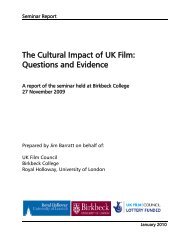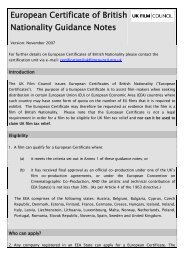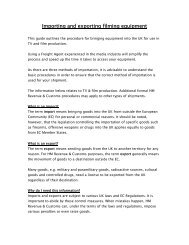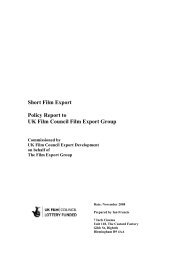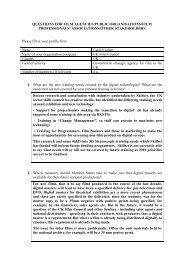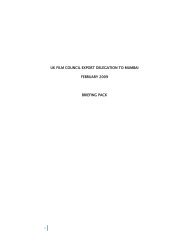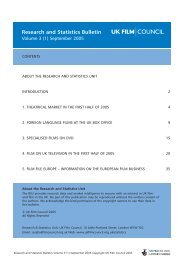Film theft in the UK - Future of Copyright
Film theft in the UK - Future of Copyright
Film theft in the UK - Future of Copyright
You also want an ePaper? Increase the reach of your titles
YUMPU automatically turns print PDFs into web optimized ePapers that Google loves.
34<br />
measures, special requirements related to<br />
border measures and crim<strong>in</strong>al procedures,<br />
which specify, <strong>in</strong> a certa<strong>in</strong> amount <strong>of</strong> detail,<br />
<strong>the</strong> procedures and remedies that must be<br />
available so that right holders can effectively<br />
enforce <strong>the</strong>ir rights. The TRIPs Agreement<br />
entered <strong>in</strong>to force on 1 January 1996 for<br />
developed countries (<strong>in</strong>clud<strong>in</strong>g <strong>the</strong> EU),<br />
whereas develop<strong>in</strong>g and least-developed<br />
countries were granted different transition<br />
periods (from 2000 to 2006) to implement<br />
its provisions.<br />
<strong>Copyright</strong> protection <strong>in</strong> <strong>the</strong><br />
US and <strong>the</strong> EU<br />
i) The status <strong>in</strong> <strong>the</strong> US<br />
The first regulatory step <strong>in</strong> <strong>the</strong> US <strong>in</strong> relation<br />
to new media took place with <strong>the</strong> adoption<br />
<strong>of</strong> <strong>the</strong> 1992 Audio Home Record<strong>in</strong>g Act,<br />
which <strong>in</strong>troduced levies on digital tapes and<br />
digital record<strong>in</strong>gs with measures to prohibit<br />
circumvention <strong>of</strong> copy protection. The Act<br />
purports <strong>in</strong> some degree to compensate for<br />
damage suffered by <strong>the</strong> music <strong>in</strong>dustry as a<br />
result <strong>of</strong> home record<strong>in</strong>g. At <strong>the</strong> time <strong>of</strong> <strong>the</strong><br />
Act, levies <strong>in</strong> relation to private audio<br />
copy<strong>in</strong>g already existed <strong>in</strong> Germany and<br />
France, becom<strong>in</strong>g a feature <strong>of</strong> national<br />
European legislations <strong>in</strong> <strong>the</strong> 1980s.<br />
The real problem, however, has been how to<br />
legislate for unauthorised Internet<br />
distribution.<br />
Whilst copyright owners have <strong>the</strong> right to<br />
prevent unauthorised distribution, on-l<strong>in</strong>e<br />
downloaders (and uploaders) are difficult to<br />
<strong>in</strong>vestigate s<strong>in</strong>ce <strong>the</strong>y are located around <strong>the</strong><br />
world and constantly switch web servers.<br />
ISPs take <strong>the</strong> view that <strong>the</strong>y have no<br />
capability to identify <strong>in</strong>fr<strong>in</strong>g<strong>in</strong>g activity and<br />
no obligation to police <strong>the</strong>ir networks –<br />
<strong>in</strong>deed from an ISP bus<strong>in</strong>ess perspective, a<br />
‘monitored’ Internet connection poses an<br />
unattractive <strong>of</strong>fer to <strong>the</strong> consumer and<br />
could affect uptake <strong>of</strong> broadband services.<br />
An uncomfortable middle ground was reached<br />
with <strong>the</strong> US Digital Millennium <strong>Copyright</strong> Act<br />
(DMCA) <strong>of</strong> October 1998, which provides a<br />
remedy to copyright owners for on-l<strong>in</strong>e<br />
copyright <strong>in</strong>fr<strong>in</strong>gement whilst limit<strong>in</strong>g <strong>the</strong><br />
liability <strong>of</strong> ISPs. Under <strong>the</strong> DMCA, ISPs must<br />
establish a policy for <strong>the</strong> term<strong>in</strong>ation <strong>of</strong> <strong>the</strong><br />
service to users who are repeat <strong>in</strong>fr<strong>in</strong>gers.<br />
Second, <strong>the</strong> ISP must accommodate and not<br />
<strong>in</strong>terfere with <strong>the</strong> copyright owners’ use <strong>of</strong><br />
“technical measures” to prevent unauthorised<br />
copy<strong>in</strong>g. The ISP has no obligation to monitor<br />
copyright <strong>in</strong>fr<strong>in</strong>gements but must respond to<br />
copyright owners’ requests for <strong>in</strong>formation or<br />
action through a Notice and Take Down<br />
Procedure. To encourage co-operation <strong>in</strong> <strong>the</strong><br />
fight aga<strong>in</strong>st piracy, <strong>the</strong> ISP is exempt from<br />
liability aris<strong>in</strong>g from <strong>the</strong> removal <strong>of</strong> <strong>in</strong>fr<strong>in</strong>g<strong>in</strong>g<br />
material after it has received notice from <strong>the</strong><br />
copyright owner.<br />
The same US legislation aims at implement<strong>in</strong>g<br />
<strong>the</strong> WIPO Treaties by provid<strong>in</strong>g protection<br />
aga<strong>in</strong>st circumvention <strong>of</strong> technical protection<br />
systems as well as by safeguard<strong>in</strong>g <strong>the</strong> <strong>in</strong>tegrity<br />
<strong>of</strong> copyright management <strong>in</strong>formation.<br />
ii) The status <strong>in</strong> <strong>the</strong> European Union<br />
The situation <strong>in</strong> <strong>the</strong> EU is somewhat similar,<br />
with Member States and <strong>in</strong>stitutions work<strong>in</strong>g<br />
on a programme <strong>of</strong> harmonisation <strong>of</strong><br />
<strong>in</strong>tellectual property.<br />
The European Enforcement Directive has<br />
already been discussed (see above, ‘Piracy <strong>in</strong><br />
<strong>the</strong> <strong>UK</strong> <strong>in</strong> a European context’).<br />
One early <strong>in</strong>itiative was to deal with Pay-TV<br />
piracy. The 1998 Conditional Access Directive,<br />
<strong>in</strong>corporated <strong>in</strong>to national law by 2000,<br />
established a Europe-wide rule aga<strong>in</strong>st piracy<br />
caused by counterfeit TV smart-cards and<br />
illegal decod<strong>in</strong>g devices, to protect European<br />
operators and broadcasters (see previous<br />
chapter: pay-TV piracy).<br />
However, <strong>the</strong> directive only protects <strong>the</strong> TV





